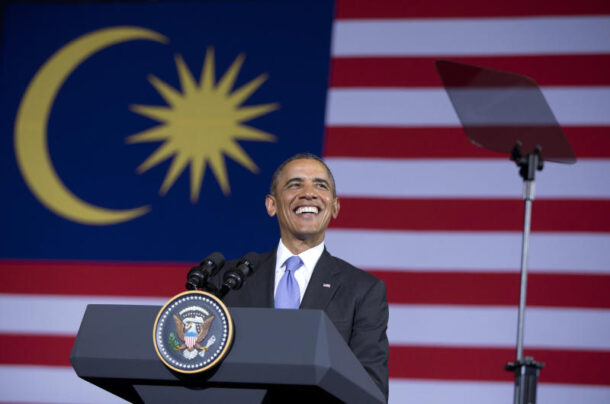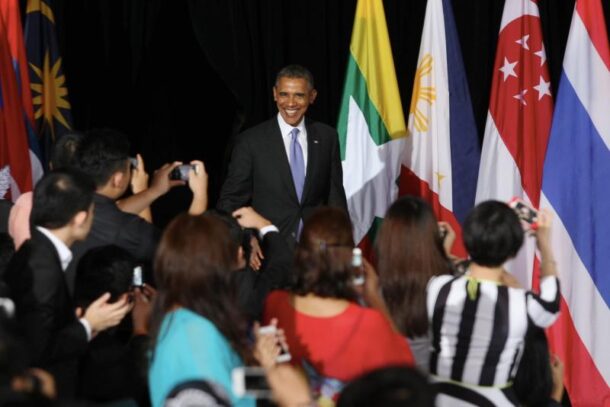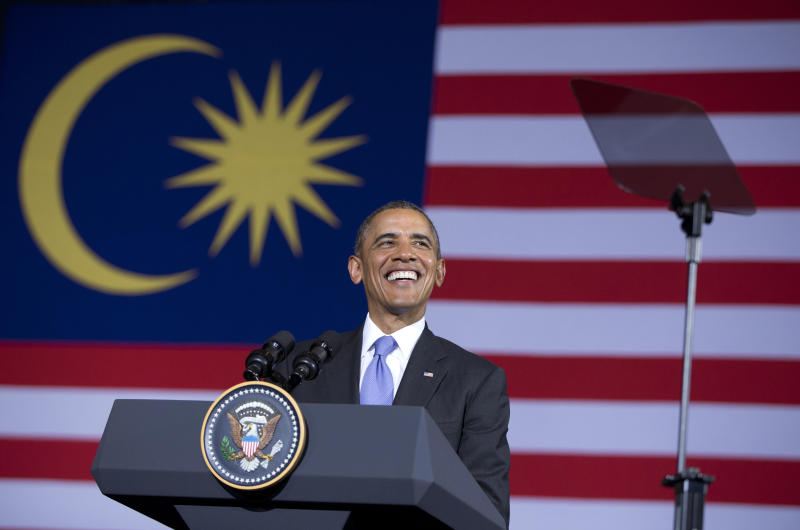By SHARMILA NAIR
alltherage@thestar.com.my
MAKING a change in a community or a nation will not happen overnight. It takes a lot of time and hard work, and even the President of the United States Barack Obama learned that lesson the hard way.
He was 24, and a newbie from Columbia University in New York City when he put his all into organising his first community meeting at the crime-infested and racially-charged South Side area in Chicago. It was a total bust.
“People said that they were concerned about crime and I wanted to create a safer space in that area. So, I organised a meeting … but no one came,” shared Obama, 52, at the Young Southeast Asian Leaders Initiative (YSEALI) townhall address at Dewan Tunku Chancelor in Universiti Malaya, Kuala Lumpur on Sunday.
Obama, who was in the country as part of a four-nation tour, spoke to 103 youths representing YSEALI and about 300 other attendees (including yours truly) at the event.
Although his first attempt at making a difference in his community was a complete failure, Obama, commanding the stage effortlessly, acknowledged that it was also one of the greatest lessons in his life.
“I learned that as a young person wanting to make a difference in the world, I have to be persistent,” he said, adding that young leaders looking to bring positive changes to their community should listen to the people and earn their trust before slowly developing their projects into bigger initiatives.
“You cannot be impatient; but the problem with young people is that they are impatient,” said Obama with a laugh. “You have to learn from your failure as well as your success.”

POTUS in the house: President Barack Obama spoke to approximately 400 youth leaders at the Young Southeast Asian Leaders Initiative (YSEALI) town hall-style event in Universiti Malaya, Kuala Lumpur.
Obama also urged young people to use the most important resource they have – “It’s between our ears,” he said – and be part of the solution to the nation’s problems. He said it is crucial for young people to educate themselves on important issues, interact with organisations that are already involved with said issues, and move towards making a difference.
“The most important thing is to realise that you can really have an impact on the world. And to achieve your dream, you have to focus not so much on the title or money you’re going to make, but on the impact you can have on other people’s lives.”
But as much as Obama wants youths to go out and achieve their dreams, he also reminded them to focus on the important things in their lives.
“This is to the people here who haven’t spoken to their parents in a while: I regret not having spent more time with my mother. She died early, right around my age right now, and it happened very fast. I didn’t reach out and communicate with her during a stretch of time, from when I was 20 to 30. I was busy with my own life,” said Obama, when asked about his greatest regrets in life. The other he said was “Wasting time on things that I thought were important when I was younger. Looking back, they don’t seem so important after all.”
Up close and personal
There have been several complaints on social media accusing participants of wasting the once-in-a-lifetime opportunity to interact with Obama by asking questions that were too personal, and not on hard-hitting world issues.
But to be honest, it was refreshing to hear Obama speaking about things like his daughters, Malia and Sasha, and how he hopes they will grow up to be good people. That’s what he hopes his legacy will be – to be remembered as a good father and a good husband. When taking that question about his legacy, he initially joked: “I still have two years left (in office). Are you rushing me?”
In fact, Obama managed to keep the whole thing candid and light-hearted. At one point, when he was picking audience members to ask questions, he pointed one guy out and said: “I like your hairstyle!”

The President arriving at the event, where he took questions from the floor – which were mostly personal in nature – and spent time greeting attendees.
But there were some heavier moments too. One attendee asked “what does happiness mean to you?”, to which he replied: “It’s a very philosophical question, but when I’m on my deathbed – not that I think about it all the time – the time I spent with the people I love will be what makes me happy.
“What’s most important to me is that I’m true to my beliefs, and that I live with integrity.”
In terms of his legacy as a President, he said he hopes to be remembered for having created opportunities for the American people to lead better lives.
“Not everybody is able to be rich, but everybody should be able to lead a good life. However, this is not something I can do by myself.”
It takes an entire nation to work together to create a better future, and the President reminded that while we should embrace our diverse cultures and be proud of our backgrounds, we should also appreciate the differences.
“Treat people the way you want to be treated. Be part of something that brings people together rather than drive them apart.”


Leave a reply